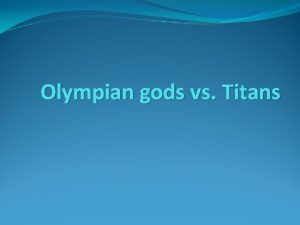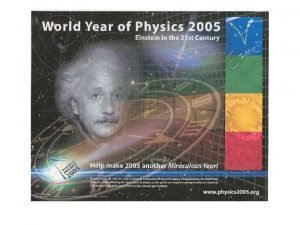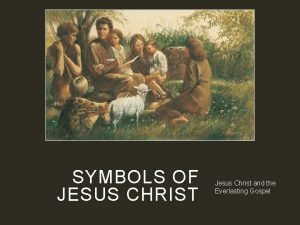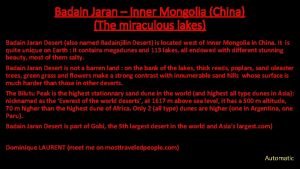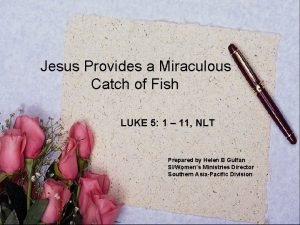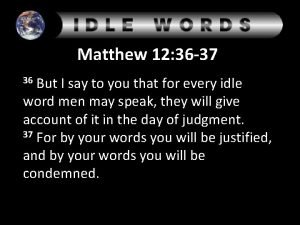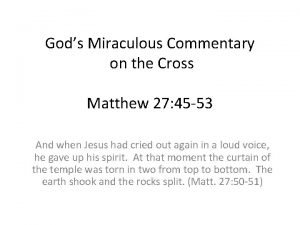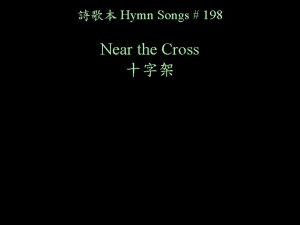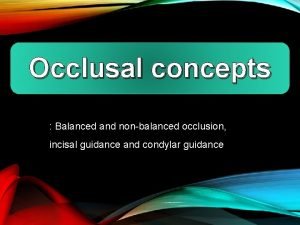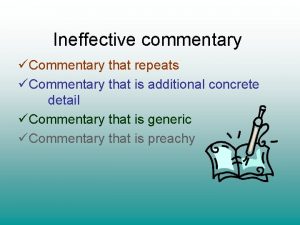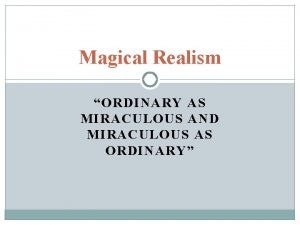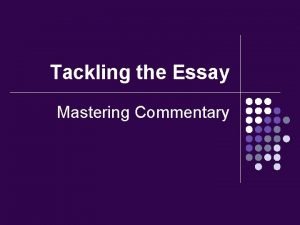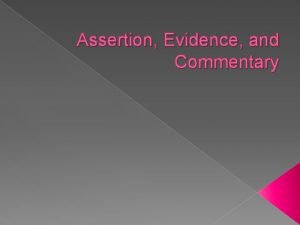Gods Miraculous Commentary on the Cross Matthew 27













- Slides: 13

God’s Miraculous Commentary on the Cross Matthew 27: 45 -53 And when Jesus had cried out again in a loud voice, he gave up his spirit. At that moment the curtain of the temple was torn in two from top to bottom. The earth shook and the rocks split. (Matt. 27: 50 -51)

Introduction • Romans had crucified about 30, 000 men in Palestine • Why does history only remember the name of Jesus?

Introduction • Answer – the death of Jesus was God’s plan to redeem sinful man – Sin of Adam and Eve not only caused their fall but also brought corruption on the entire earth – Abraham was prepared to offer his son, Isaac, as a sacrifice to God; but a ram was substituted – God offered his Son, Jesus; no substitute – Animal sacrifices in law of Moses portrayed the necessity of shedding blood for the remission of sin • But animal blood could not remove sin, so it had to be repeated continuously – Christ’s blood was the once-for-all sacrifice for all sins

Overview • Six miracles form God’s own commentary of the meaning of the cross Miracle Supernatural darkness Sovereign departure Self-giving death Sanctuary devastation Soil disturbance Subduing death Verses v. 45 vv. 46 -49 v. 50 v. 51 a v. 51 b v. 52 -53

Supernatural Darkness (v. 45) From the sixth hour until the ninth hour darkness came over all the land. (Matt. 27: 45) • When Jesus was born, the night sky was filled with supernatural light (Luke 2: 9) • Jesus was the “light of men” (John 1: 4) and “the light of the world” (John 8: 12) • When Jesus died there was no supernatural light, there was darkness from noon until 15: 00 – Not an astronomical eclipse – Babylonian Talmud – darkening of the sun was judgment of God on the world for unusually wicked sin – Cross was place of immense divine judgment; sins of the world were poured out on the sinless, perfect Son – Supernatural darkness was God’s reaction to sin in that act of judgment

Sovereign Departure (vv. 46 -49) About the ninth hour Jesus cried out with a loud voice, “Eloi, lama sabachthani? ” – which means, “My God, my God, why have you forsaken me? ” When some of those standing there heard this, they said, “He’s calling Elijah. ” Immediately one of them ran and got a sponge. He filled it with wine vinegar, put it on a stick, and offered it to Jesus to drink. The rest said, “Now leave him alone. Let’s see if Elijah comes to save him. ” (Matt. 27: 46 -49) • Sovereign departure – somehow God was separated from God • Jesus was quoting well-known Psalm 22 • Jesus was experiencing separation from His heavenly Father for the first and only time in eternity – Only time in Scriptures where Jesus did not address God as Father – Because the Son had taken sin upon Himself, the Father turned His back

Sovereign Departure (vv. 46 -49) • Great and imponderable mystery – Far too deep for even the most mature believer to comprehend – Even Martin Luther could not understand it – The God-man was separated from God for a brief period of time at Calvary – Furious wrath of the Father was poured out on the sinless Son, who in matchless grace became sin for those who believe in Him

Sovereign Departure (vv. 46 -49) • Habakkuk 1: 13 – “Your eyes are too pure to look on evil; and you cannot tolerate wrong. ” – God turned His back when Jesus was on the cross because He could not look upon sin, even in His own Son – Because Jesus died a substitute sacrifice for the sins of the world, the righteous heavenly Father had to judge Him fully according to that sin • Jesus became sin for us – “our transgressions and our inequities” (Isaiah 53: 5) – “died for our sins according to the Scriptures” (1 Cor. 15: 3) – “God made him who had no sin to be sin for us” (2 Cor. 5: 21) – “a curse for us” (Gal. 3: 13) – “He bore our sins in his body on the cross” (1 Pet. 2: 24) – “died for sins once for all, the just for the unjust” (1 Pet. 3: 18) – “became the propitiation for our sins” (1 John 4: 10)

Self-giving Death (v. 50) And when Jesus had cried out again in a loud voice, he gave up his spirit. (Matt. 27: 50) • Jesus willingly sacrificed Himself for the sins of the world in obedience of His Father’s will • Jesus had cried out again in a loud voice - demonstrated considerable physical strength remaining • Jesus’ last words – “It is finished” (John 19: 30) – His work was complete – “Father, into your hands I commit my spirit” (Luke 23: 46) • Gave up – apheimi – letting go or sending away, indicating an act of free will – Jesus life was not taken from Him; He surrendered it freely • Jesus died much sooner than normal; Pilate was surprised and asked a centurion to verify it

Sanctuary Devastation (v. 51 a) At that moment the curtain of the temple was torn in two from top to bottom. (Matt. 27: 51 a) • A huge curtain separated the Holy of Holies from the rest of the Temple – Once a year the High Priest was allowed to pass through the curtain on the Day of Atonement to sprinkle blood on the altar for the sins of the people • When Christ died – Once-for-all sacrifice was completed; need for a curtain no longer existed – By coming to the Son, any man could now come to God directly without need of a priest, sacrifice, or ritual

Soil Disturbance (v. 51 b) The earth shook and the rocks split. (Matt. 27: 51 b) • Immediately after Jesus died and the Temple curtain was torn in two, the earth shook and the rocks split • Old Testament gives insight into significance of this occurrence – When God appeared to Moses on Mt. Sinai, “the whole mountain quaked violently” (Ex. 19: 18) • Earthquake was a foretaste of what God will do when one day He shakes the earth in judgment at the coming of the King of kings

Subduing Death (vv. 52 -53) The tombs broke open and the bodies of many holy people who had died were raised to life. They came out of the tombs, and after Jesus’ resurrection they went into the holy city and appeared to many people. (Matt. 27: 52 -53) • Miracle - many holy people who had died were raised to life • Lord selectively raised the bodies of certain believers who had died • After Jesus’ resurrection, those select resurrected saints went into the holy city and appeared to many people – Did not appear in Jerusalem until after the Lord’s own resurrection because He was divinely appointed to be “the first fruits of those who have fallen asleep” (1 Cor. 15: 20)

Conclusion • Through these six miracles the Father was saying the cross is the only hope for eternal life – When one’s sin is carried away by Christ’s atoning death, the wrath of God is appeased for that believer – The believer is delivered from the death and condemnation that the Lord endured on his behalf – For those who believe in the Son, access to God is open wide – Believers are assured of being in His eternal and indestructible kingdom in eternal and indestructible bodies
 Greek gods vs titans
Greek gods vs titans The miraculous year
The miraculous year Todd parker byu devotional
Todd parker byu devotional Miraculous
Miraculous Miraculous
Miraculous Mathew 12:36-37
Mathew 12:36-37 Matt 27 commentary
Matt 27 commentary Diagram of incomplete dominance
Diagram of incomplete dominance Difference between dihybrid and monohybrid cross
Difference between dihybrid and monohybrid cross Test cross and back cross
Test cross and back cross In the cross, in the cross be my glory ever
In the cross, in the cross be my glory ever Test cross and back cross with example
Test cross and back cross with example Incisal guidance
Incisal guidance Gấu đi như thế nào
Gấu đi như thế nào
